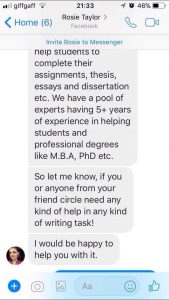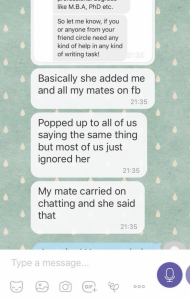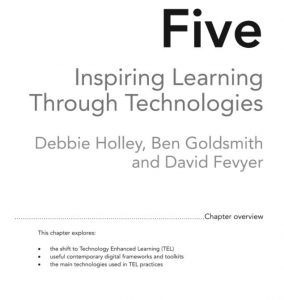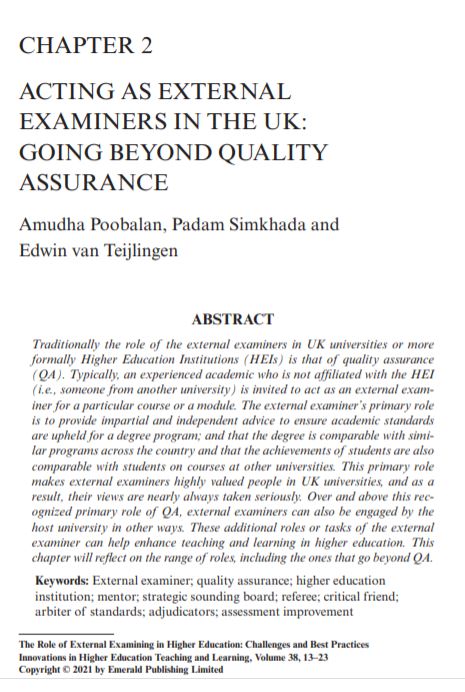
Essays Mill in UK HE
The use of essay mills in UK higher education has been a topic of concern for several years. It has been considered a sensitive subject within academia by students and staff alike, with institutions requiring that academics take preventative measures.
Since the increased marketisation of UK higher education in 2012, where tuition fees increased as a result of the Browne Review (2010), and the subsequent reduced cap in the number of students who can now attend university, institutions have seen an increase in students applying for a place to study.
Universities are seemingly weighted by a digital mindset coined as Generation Z (aka as iGen or Linksters), the newest age group to emerge since the Millennials, who in turn, were the largest group since the baby boom generation. The later two generations – Gen Z and Millenials – have had the advantage of technology providing instant responses and offering information 24/7, allegedly creating a generational digital need within the curriculum and delivery, processes and procedures in order to exploit engagement and feedback in ways that a knowledge institution, or its inhabitants, may not yet be fully – or seemingly desirably – aligned.
With students entering HE from a mixed economy of practical, academic, cultural and educational skill sets, alongside external issues and commitments, and hopes for secure employment, students may, at times, struggle to engage with courses, assessment, multiple deadlines, grades, and feedback.
In frustration, students may be tempted to turn to the phenomenon of essay mills, a paid-for external service that writes essays for students, and crosses intellectual boundaries that underpin plagiarism, a much-frowned-upon activity by those in academia and beyond.
It is not just the students who do not wish to admit to being tempted by an essay mill offer, it can be a complex conversation for the institution and society, too.
Project Purpose: The purpose of this project is to gather perceptions and experiences relating to the essay mill phenomena. It focuses on the academic, student, and professional staff voices, and seeks to understand experiences of students commissioning essay writers/essay mills, an external paid for service whereby essays are written to order.
This overall project was not designed to be pejorative or demonise any of the participants, but to find out what’s really going on. The data will be important for understanding the needs of the C21st student, as seen through multiple lenses.
If you would like to be interviewed informally over coffee or off campus, please contact Steph Allen: stephaniea@bournemouth.ac.uk.
Survey links can be found below. Please share the relevant link to academics or student cohorts.
Undergraduates: https://bournemouth.onlinesurveys.ac.uk/turning-to-the-churnthe-commissioning-of-essay-mills-in-u
Masters: https://bournemouth.onlinesurveys.ac.uk/the-commissioning-of-essay-mills-in-uk-higher-education-p-2
Doctoral Candidates: https://bournemouth.onlinesurveys.ac.uk/the-commissioning-of-essay-mills-in-uk-higher-education-p-3
Academics: https://bournemouth.onlinesurveys.ac.uk/turning-to-the-churnthe-commissioning-of-essay-mills-in-u-2
Deciding to take part or not, will not impact on your (or others) employment or studies at BU, or elsewhere in the future. Ethics number: 21274

 This week saw saw the publication of two book chapters on very different aspects of university education. First, Prof. Debbie Holley, Dr. Ben Goldsmith and Dr. David Fevyer co-authored ‘Inspiring Learning through Technologies’. This is chapter 5 in the newly published second edition of the textbook Enhancing Teaching Practice in Higher Education published by SAGE [1].
This week saw saw the publication of two book chapters on very different aspects of university education. First, Prof. Debbie Holley, Dr. Ben Goldsmith and Dr. David Fevyer co-authored ‘Inspiring Learning through Technologies’. This is chapter 5 in the newly published second edition of the textbook Enhancing Teaching Practice in Higher Education published by SAGE [1]. 














 Dr. Ashraf cited on ‘Modest Fashion’ in The Guardian
Dr. Ashraf cited on ‘Modest Fashion’ in The Guardian NIHR-funded research launches website
NIHR-funded research launches website Academics write for newspaper in Nepal
Academics write for newspaper in Nepal New paper published on disability in women & girls
New paper published on disability in women & girls Global Consortium for Public Health Research 2025
Global Consortium for Public Health Research 2025 MSCA Postdoctoral Fellowships 2025 Call
MSCA Postdoctoral Fellowships 2025 Call ERC Advanced Grant 2025 Webinar
ERC Advanced Grant 2025 Webinar Horizon Europe Work Programme 2025 Published
Horizon Europe Work Programme 2025 Published Horizon Europe 2025 Work Programme pre-Published
Horizon Europe 2025 Work Programme pre-Published Update on UKRO services
Update on UKRO services European research project exploring use of ‘virtual twins’ to better manage metabolic associated fatty liver disease
European research project exploring use of ‘virtual twins’ to better manage metabolic associated fatty liver disease